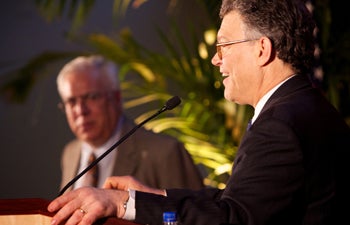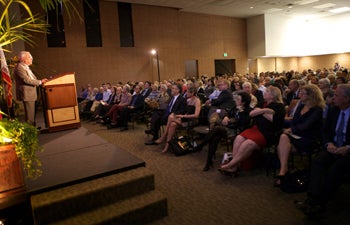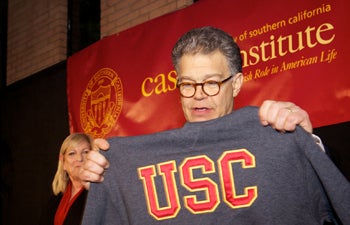Frankly Speaking
Sen. Al Franken (D-Minn.) began his lecture at USC before a crowd of more than 500 with, “Today I’d like to talk about three Jews: A printing salesman, a rabbi and a professor.
“This, mind you, is not a set up for a joke. Although that would be a pretty good way to start talking about how the Jewish tradition has influenced me. And it would make the printing salesman proud. His name was Joe Franken and he was my father.”
Titled, “Public Service: How the Jewish Tradition has Influenced One Senator,” the talk was the 12th annual Carmen and Louis Warschaw Distinguished Lecture hosted by the USC Casden Institute for the Study of the Jewish Role in American Life, housed in USC Dornsife.
The lecture was the first held after the November 2012 death of USC Honorary Trustee and alumna Carmen Warschaw at age 95. A formidable political force in her own right, Warschaw helped forge the California Democratic Party and the careers of many of its leaders.
A passionate advocate for Jewish and women’s causes, Warschaw was remembered throughout the April 3 event held at the Davidson Continuing Education Conference Center.
“Carmen was thrilled to see USC have its first woman provost and she was particularly pleased that that provost happened to share her love of politics and had the good sense to marry an Israeli,” USC Provost Elizabeth Garrett told the audience. “We all know that USC is a better place because of what Carmen has done for our university, for our many Jewish students and students committed to public service. We miss Carmen tremendously, particularly at events like this.”

Bruce Zuckerman, professor of religion and linguistics and director of the Casden Institute in USC Dornsife, stands with Sen. Al Franken on stage during the 12th annual Carmen and Louis Warschaw Distinguished Lecture held at USC. Photo by Jon Vidar.
Bruce Zuckerman, professor of religion and linguistics, and director of the institute, recalled how the Warschaws were instrumental in helping to launch the institute 15 years ago.
“Lou was the first chair of our advisory board,” Zuckerman said. “This lecture series has been a flagship event for us every year, and the presence of Senator Al Franken serves as a yet another reminder of the important role the Warschaw family has played at USC and, in particular, in the development of the Casden Institute.”
Some past lecturers in this series were members of Congress Henry Waxman and Barney Frank, and members of the Senate Barbara Boxer, Dianne Feinstein and Joseph Lieberman.
In attendance were Warschaw’s daughter, Hope Warschaw and Hope’s husband John Law. Hope Warschaw presented Franken with a USC sweatshirt.
Franken spoke fondly of working with Carmen Warschaw on political causes and referred to her as a prime example of someone who took action for justice. Focusing his lecture on how the Jewish tradition has influenced his life and careers, Franken returned to the printing salesman, rabbi and professor.

USC Dornsife’s Bruce Zuckerman speaks before the crowd of more than 500 at USC before Sen. Al Franken takes the stage. Photo by Jon Vidar.
“My dad never graduated from high school and never really had a career,” Franken said. Joe Franken eventually found work as a printing salesman, allowing him, his wife and two sons to live in a two-bedroom house in suburban Minneapolis.
“I got to grow up middle class at a time when growing up middle class in America meant that you were the luckiest kid in the world,” Franken said. “Even though my dad wasn’t what you would call wildly successful, he was just a fantastic guy. He was a nice guy; he was a gentle guy; and most important of all for this lecture, he was a funny guy.”
Before Franken became senator, he spent 37 years as a comedian, most notably as a writer and performer for the television show Saturday Night Live. After leaving SNL, he hosted his nationally syndicated, political radio talk show The Al Franken Show, and authored six books, including four political satires.
“You might speculate humor is such an important part of the Jewish tradition because the Jewish tradition also includes a lot of suffering, and humor is how we got through it all,” Franken said. “For me it’s simple. I became a comedian because my dad loved comedy.
“My dad died of lung cancer about 20 years ago,” Franken said to a silenced room. “Which brings me to a funny story.”
Franken recalled his father in bed at home in hospice care. Their temple’s new rabbi called wanting to visit Joe.
“ ‘I wonder if I can come over and talk to your dad,’ the rabbi asked Franken. “I thought about it and I said, ‘You know, rabbi, thank you for offering to do that, but dad knows he’s dying. He knows we know he’s dying, but he hasn’t brought it up. Unless he brings it up, I don’t think he wants to talk about it.”
A few days later, the rabbi called again and asked if he could come over and comfort his mother.
“ ‘Oh, God yes. She’s a mess,’ ” Franken told the rabbi.
So the rabbi arrived and spoke to Franken’s mother. As he was leaving, he asked if it would be OK if he talked to Joe.
“Ah ha! That’s the whole ‘comfort mom’ bit,” Franken said to himself, but walked down the hall to his parent’s room to ask. Five days before his death, Joe Franken was weak, down to 80 pounds.
“Dad, Rabbi Black from temple is here wondering if he could come in and talk to you,” Franken told his father, who summoned all of his strength to speak.
“Well,” Franken said, lowering his voice to sound like his father. “I don’t really know him. But if he feels it will do him some good.”
The room exploded in laughter and Franken became tearful remembering his father.
“I laughed really hard and dad smiled,” Franken said. “I’ll never forget that smile.”
Humor was paramount in the Franken home.
“Some of the best parts of my childhood were simply sitting in front of the TV with my mom, dad and brother watching Jack Benny or Buddy Hackett or Jackie Byrne, just laughing. But we also watched the news.”
In the early ’60s, the family followed the civil rights struggles; they saw what happened to demonstrators in the South in places such as Birmingham, Ala.
“I remember vividly watching sheriffs in southern towns turn dogs and fire hoses on demonstrators,” Franken said. “I was born seven years after the Holocaust. And our parents pounded the horror of that into our heads. So my dad, when we saw demonstrators being clubbed and having dogs attack them and having fire hoses turned on them, my dad would point to the TV and look at me and my brother and say, ‘That is wrong. That is wrong. No Jew can be for that.’ ”
The rabbi in Franken’s trilogy was his rabbi growing up, Rabbi Max Shapiro from Temple Israel, the first Jewish congregation in Minneapolis. Franken remembers the same thread throughout all of his sermons: it’s not enough to be just and good; one has to do justice.
“These are not just words to live by, they are a call to action,” Franken recalled learning from Shapiro’s sermons.

Sen. Al Franken receives a USC sweatshirt from Hope Warschaw. Photo by Jon Vidar.
But it wasn’t until Franken met the third Jew in his story — the professor — that he truly understood how to implement a call to action.
“That man was Paul Wellstone,” he said to the sound of a collective gasp.
Franken recounted Wellstone’s strong political activism as a professor in Northfield, Minn. Wellstone was fired, Franken said, then after a sit-in by his devoted students, rehired with tenure. When Wellstone decided to run for senator, Franken and his parents campaigned vigorously for him.
Wellstone won a senate seat in 1990. He represented Minnesota in the United States Senate from 1991 until his death in a plane crash in 2002. Franken now holds the senate seat once held by his mentor Wellstone.
Franken has carried on many of the battles fought by Wellstone. A major cause is equality for the lesbian, gay, bisexual and transgender (LGBT) community.
“LGBT equality, I believe, is the civil rights fight of our time,” Franken said. “And when I look at laws proclaiming gays and lesbians are second class citizens, that their loving and committed unions are second class, that their families are second class families, it seems to me that no Jew can be for that either.”